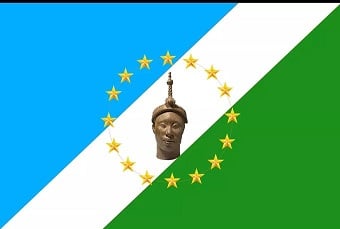Crabs and Crayfish: The Case for Cultural Integrity in Yoruba Institutions
By Ade Adebajo MFR HeadlineNews.News Special Report.
May 2025
“Aparo le f’eyin e gbo, sugbon kii se adaba.”
(A partridge may resemble a dove by posture, but it can never be one.)
In the beautifully diverse yet dangerously fragile fabric of Nigerian society, identity is everything. When boundaries between cultural admiration and cultural appropriation are blurred, the very soul of a people is at risk. This conversation has become urgent as Yoruba socio-cultural groups find themselves confronting the issue of non-Yoruba inclusion under the guise of unity, admiration of the culture, or mere fluency in the Yoruba language.
But let us be clear: a crayfish may live in the same water as a crab, but it will never be a crab.

Understanding Identity: Culture Is Not a Costume
To belong to a tribe is not a matter of linguistic proficiency, admiration, or residence. It is a matter of lineage, ancestry, and inherited obligation. As the Yoruba adage goes:
“Awodi ko le se be, ko d’araba.”
(The hawk cannot imitate the stance of the iroko tree and become one.)
While the global admiration for Yoruba culture is undeniable—evident in Brazil, Cuba, Trinidad, and the Americas—these Afro-descendants trace direct ancestry to enslaved Yoruba people. Their cultural rights are inherited, not acquired through interest or proximity.

The Dangers of Sentimental Inclusion
Nigeria’s geopolitical structure is an imposed amalgamation, not a natural fusion. The British colonial enterprise forced over 250 distinct ethnic nationalities—often with incompatible worldviews—into a single political cage called Nigeria. To imagine that ethnic cultural groups must now be “inclusive” because we share a passport is a dangerous illusion.
> Chinua Achebe once warned:
“When we forget who we are, we lose everything. A people without knowledge of their past or culture are like a tree without roots.”
Inclusion without ancestry leads to dilution, and dilution leads to disappearance.

History Teaches Us: Nations Guard Their Culture
The Igbo have organizations like Ohanaeze Ndigbo for Ndigbo only. No Yoruba, no matter how fluent in Igbo, would ever be admitted.
The Arewa Consultative Forum is strictly for Northerners.
The Yorubas have the Afenifere and various socio- cultural & socio political Groups meant only for Yorubas till today.
The UAE have socio- cultural and socio- political groups which have guided them through the invasion of non- indigenous commercial concerns to protect their cultural integrity. Non- indigenes are kept with certain limitations no matter how well they speak the language or proclaim admiration.
Japan, despite its modern openness, strictly limits cultural heritage rights to ethnic Japanese.
Same goes for so many nations and tribes in the world, including Asia, Korea etc.

Why then should Yoruba groups compromise?
The Yorubas are the largest homogeneous tribe in Nogeria, West Africa & Africa.
Why Ethnic Integrity Must Be Defended
1. Cultural groups are for preservation, not popularity. A Yoruba cultural group exists to preserve tradition, lineage, language, and ancestral mandates—not to please social influencers or wealthy sympathizers.
2. Emotional alignment is not spiritual entitlement. A non-Yoruba woman may wear iro and buba, speak flawless Yoruba, or even marry a Yoruba man. But when ethnic survival is threatened, blood will answer blood. Loyalty will revert to origin.
3. Power dynamics matter. Today’s leniency has birthed political audacity—non-Yorubas now contest local seats and dream of governing Yoruba states. Why? Because we gave them the rope.

A Line Must Be Drawn
There must be dedicated Yoruba-only cultural institutions—unapologetically so. These groups must define their membership by birthright, not by admiration, wealth, or language skills. As Wole Soyinka once said:
“A tiger does not proclaim its tigritude. It pounces.”
The Yoruba must stop begging for inclusion in their own heritage. We must protect our spiritual, political, and cultural identity with the firmness of nations that understand what is at stake.

Conclusion: Let the Crabs Be Crabs
It is neither arrogance nor hatred to say “you are not one of us.” It is survival. Let the Yoruba define Yoruba identity—not Instagram likes, not political correctness, not borrowed tongues. A crab has its walk. A crayfish has its bend. Let each creature walk in its destiny.
G. Ade Adebajo-Fraser MFR




